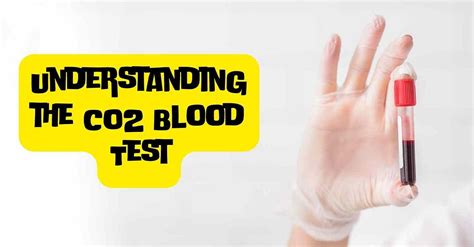Intro
The importance of maintaining a healthy balance of carbon dioxide (CO2) levels in the blood cannot be overstated. CO2 is a byproduct of the body's metabolic processes and is typically expelled through exhalation. However, when CO2 levels in the blood become too low, it can lead to a range of health issues. A low CO2 blood test result can be indicative of various underlying conditions, and understanding the causes and implications of low CO2 levels is crucial for effective management and treatment. In this article, we will delve into the world of low CO2 blood tests, exploring the possible reasons behind this condition and what it means for overall health.
Low CO2 levels in the blood, also known as respiratory alkalosis, can occur due to several factors, including hyperventilation, high-altitude environments, and certain medical conditions. When the body loses too much CO2, the blood pH becomes more alkaline, leading to an imbalance in the body's acid-base balance. This imbalance can affect various bodily functions, including the nervous system, muscles, and heart. It is essential to identify the underlying cause of low CO2 levels to develop an effective treatment plan.
The significance of CO2 blood tests lies in their ability to provide valuable insights into the body's metabolic state and respiratory function. By analyzing CO2 levels, healthcare professionals can diagnose and monitor conditions such as respiratory alkalosis, identify potential respiratory problems, and assess the effectiveness of treatments. Moreover, understanding the factors that contribute to low CO2 levels can help individuals take preventive measures to maintain optimal CO2 balance and overall health. In the following sections, we will explore the possible causes of low CO2 blood test results and discuss ways to address this condition.
Understanding Low CO2 Blood Test Results

Causes of Low CO2 Blood Test Results
There are several factors that can contribute to low CO2 blood test results. These include: * Hyperventilation: Rapid and deep breathing can lead to excessive loss of CO2 from the body, resulting in low CO2 levels. * High-altitude environments: At high altitudes, the air pressure is lower, which can cause the body to lose more CO2. * Medical conditions: Certain medical conditions, such as asthma or COPD, can affect the body's ability to regulate CO2 levels. * Metabolic disorders: Conditions such as diabetes or kidney disease can affect the body's metabolic processes, leading to changes in CO2 levels.5 Ways to Address Low CO2 Blood Test Results

Preventing Low CO2 Blood Test Results
Preventing low CO2 blood test results requires a combination of lifestyle modifications and medical management. Some strategies for preventing low CO2 levels include: * Practicing healthy breathing techniques * Staying hydrated * Managing stress * Monitoring and managing underlying medical conditions * Avoiding high-altitude environments or taking precautions when traveling to high-altitude areasManaging Low CO2 Blood Test Results

Complications of Low CO2 Blood Test Results
If left untreated, low CO2 blood test results can lead to several complications, including: * Respiratory alkalosis: A condition characterized by an imbalance in the body's acid-base balance, which can lead to symptoms such as dizziness, confusion, and muscle weakness. * Neurological problems: Low CO2 levels can affect the nervous system, leading to symptoms such as numbness, tingling, and seizures. * Cardiovascular problems: Low CO2 levels can affect the heart, leading to symptoms such as palpitations, arrhythmias, and cardiac arrest.Conclusion and Next Steps

We invite you to share your thoughts and experiences with low CO2 blood test results in the comments section below. Have you or someone you know received a low CO2 blood test result? What steps did you take to address the underlying cause? Share your story and help others understand the importance of maintaining healthy CO2 levels.
What is a low CO2 blood test result?
+A low CO2 blood test result indicates that the level of carbon dioxide in the blood is below the normal range, typically less than 23 mEq/L.
What are the causes of low CO2 blood test results?
+Low CO2 blood test results can be caused by hyperventilation, high-altitude environments, medical conditions such as asthma or COPD, and metabolic disorders.
How can I address low CO2 blood test results?
+To address low CO2 blood test results, practice slow and deep breathing exercises, stay hydrated, manage stress, monitor and manage underlying medical conditions, and consider supplements under the guidance of a healthcare provider.
